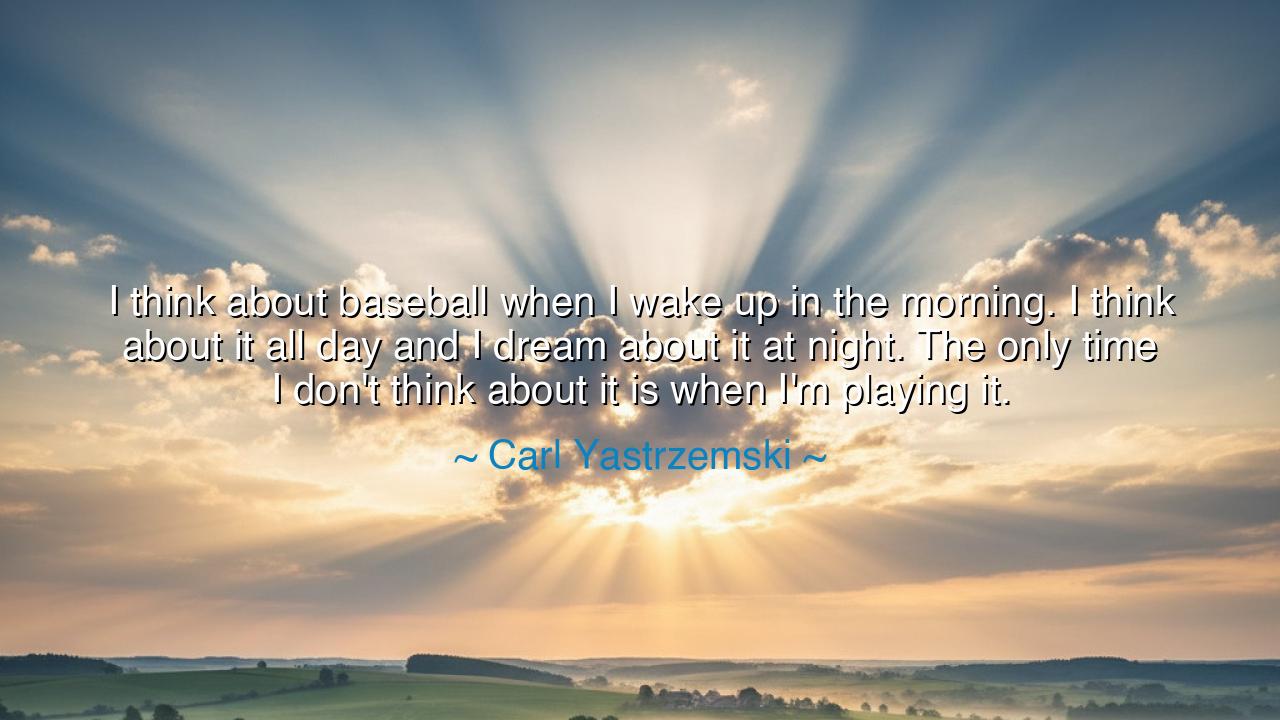
I think about baseball when I wake up in the morning. I think
I think about baseball when I wake up in the morning. I think about it all day and I dream about it at night. The only time I don't think about it is when I'm playing it.






Carl Yastrzemski, one of baseball’s eternal legends, once confessed: “I think about baseball when I wake up in the morning. I think about it all day and I dream about it at night. The only time I don’t think about it is when I’m playing it.” These words are more than a tribute to a sport—they are a revelation of the nature of passion itself, of the consuming fire that drives a man to dedicate his entire being to a single pursuit. They speak to the eternal hunger of mastery, the way love for a craft infiltrates every thought, every hour, every breath.
To think of baseball at dawn is to show how passion shapes the rhythm of life. Yastrzemski awoke not to leisure or distraction, but to devotion. His mind turned immediately to the game, as if the rising sun itself shone upon a diamond field. This is the mark of true dedication: when the first thought of the day belongs not to comfort or complaint, but to the work that gives life its meaning. The ancients would call this telos, the purpose that calls the soul out of sleep into action.
Yet, the paradox he shares is striking: the only time he did not think of baseball was while he was actually playing it. Why? Because in the moment of pure performance, thought gives way to instinct, and desire surrenders to presence. In that sacred space, there is no room for imagining or planning—the body becomes the vessel, the game becomes the universe, and the mind is silent. This is what philosophers and warriors alike have called “flow”—the state where man and action are one.
History gives us echoes of this truth. Miyamoto Musashi, the famed samurai, wrote that one must think always of the Way—whether walking, eating, or resting—yet in battle, the swordsman must cease thinking and simply strike. So too did Michelangelo, who confessed that he saw his sculptures in every block of marble long before he touched it, yet in the act of chiseling, he thought no longer, only obeyed the vision. Yastrzemski joins this lineage, his words proving that the mind prepares endlessly, but in the moment of creation, the spirit takes over.
The deeper meaning is this: true devotion is not a part of life, but the fabric of it. When one loves something so deeply, it saturates waking and dreaming alike. To Yastrzemski, baseball was not just a game to play but the atmosphere he breathed, the lens through which he saw the world. His greatness was not built only on talent, but on this ceaseless meditation, this constant turning of his heart toward the diamond.
But his words are also a lesson in balance. While thought, planning, and dreaming prepare the ground, they must eventually yield to action. Too much thought can bind a man, but action frees him. The truest mastery comes when preparation and instinct join together, when the mind, after dwelling on its craft endlessly, can finally fall silent and let the body act without hesitation.
Therefore, let us take this teaching: whatever your calling—be it art, craft, sport, or service—let it fill your mornings, your days, and your nights. Think on it, dream on it, let it saturate your being. But when the moment comes to perform, release thought and enter the sacred silence of action. For it is there, in that union of devotion and instinct, that greatness is born, and a man transcends himself to become legend.






AAdministratorAdministrator
Welcome, honored guests. Please leave a comment, we will respond soon